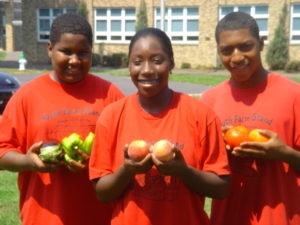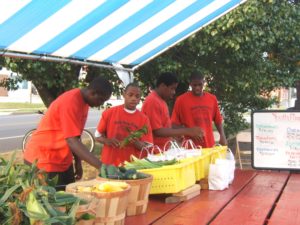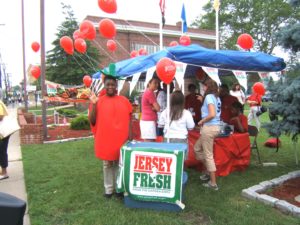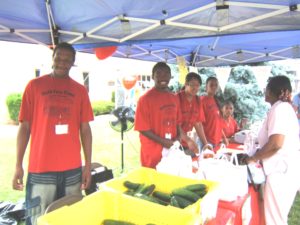The Youth Farmstand: Seeding Success for Youth, Farmers & Communities
Since 2003, the Seeds to Success program has been training New Jersey youth in new job skills, bringing business to farmers, and increasing community access to healthy food.
In 2003, Rutgers Cooperative Extension (RCE) of Gloucester County launched Seeds to Success, a youth farmstand project. Now in its 8th year, Seeds to Success, part of a statewide RCE youth farmstand initiative, is the largest youth farmstand initiative in New Jersey.

Seeds to Success youth partners show off “Jersey Fresh” peppers, eggplant, peaches and tomatoes. Photo by LuAnne Hughes
It prepares special needs*, at-risk youth for the workforce through classroom and on-the-job training. (*Special needs students have Individual Educational Plans developed to support learning and education.)
Seeds to Success Youth Farmstands bring new business and affordable, nutritious foods to residents of three limited resource communities. The farmstands are a unique example of economic development in at-risk communities. And, they support local farmers by offering three new outlets to sell their crops at competitive, profitable prices.
Seeds to Success is a multi-faceted project with four key goals: Support local farmers by creating new retail outlets for their products; Build food security and healthier, stronger communities; Increase workplace readiness skills in special needs, at-risk youth; and Improve life skills in at-risk, special needs youth.
Because the project is multi-faceted with a range of goals, Seeds to Success offers a plethora of benefits to a number of audiences within its targeted communities.
Reaching a Diverse Audience
Seeds to Success addresses numerous county needs: food security, economic and community development, workplace preparedness, lifeskills development, community service opportunities for special needs youth and improved nutrition/health. The project reaches out to a diverse audience:

Seeds to Success youth partners on the morning shift set up their farmstand for business. Photo by LuAnne Hughes
Community. At least 20% of the population in each of the target communities is considered “at-risk,” that is, at or below poverty level. These communities have initiatives to address neighborhood revitalization and consider Seeds to Success a logical “fit” into these efforts. All community partners were anxious to bring fresh, locally grown produce to their residents, knowing that increased access to healthy foods directly correlates to increased consumption which may, in turn, reduce chronic disease risks.
Farmstand customers purchase produce with cash, food stamps and Farmers’ Market Nutrition Program (FMNP) vouchers. The FMNP was established by Congress in July 1992, to provide fresh, nutritious, unprepared, locally grown fruits and vegetables through farmers’ markets to WIC participants and qualifying senior citizens. It is also designed to expand the awareness, use of and sales at farmers’ markets. In New Jersey, WIC clients and seniors receive $30 per year, per recipient. FMNP vouchers account for 10-15% of Seeds to Success youth farmstand sales annually.
Youth. Although educational programs in our county provide workforce preparation to special needs students, there is a significant disparity between the number of youth who require training and the number of workplace opportunities available. All youth, regardless of their physical and mental conditions, need and deserve the opportunity to be involved in activities unique to their own talents and interests…in preparation for adulthood in a world with great diversity. Many Seeds to Success students would have few employment opportunities without the farmstands. Seeds to Success also fosters citizenship, self-esteem and personal development for “at-risk*” youth. (*Youth are classified at-risk due to family situations, behavioral problems or low academic achievement records.)

A typical Seeds to Success grand opening is a festive event that draws a large crowd of local customers and the media. Photo by LuAnne Hughes
Seeds to Success involves both in-school and on-the-job training. During the school year, youth participate in food/nutrition, food safety, banking and financial education. During the summer, youth apply this knowledge at one of the three farmstands, where they experience many aspects of a retail entrepreneurial enterprise.
Farmers. Despite living in close proximity to local farms, residents of targeted communities have limited access to locally grown produce. Neither supermarkets nor area farm markets are easily accessible via walking or via public transportation. While there is a need, economic restraints, poor marketing conditions and lack of trained, affordable manpower limit the ability of local farmers to expand retail markets by opening and operating farmstands in new, low-income communities.
There have been attempts to increase access to locally grown produce in each targeted community. However, starting and keeping retail farm markets in operation demands a great deal of attention to consumer, vendor and community needs. Collaborations between farmers and local agencies established “portable” farmstands that traveled throughout the community to serve WIC clients, seniors and food stamp recipients have failed, largely because: there was no established, long-term allegiance to the initiative; participating farmers made little profit and were unwilling to continue; and there was limited awareness and support from the community in general. Other attempts to operate farm markets have met with limited success, primarily because trained, affordable labor to staff farm markets is not available. To participate, farmers must staff farm market booths themselves, taking them away from managing their farms and reducing profit.

Seeds to Success youth partners and their customers. Photo by LuAnne Hughes
Seeds to Success offers a profitable alternative to farmers, enabling them to establish new retail outlets for their products – with limited labor investments. Currently, we work with 3 local farmers, who stock our farmstands with New Jersey tomatoes, corn, cucumbers, peppers, squash, eggplant, blueberries, peaches, nectarines, plums, and melons. Seeds to Success youth farmstands purchase $10,000-$14,000 worth of produce each year, during a 5-7 week period each summer when they operate 3 days per week, 6 hours daily.
A Catalyst of Change
Seeds to Success has resulted in a number of positive outcomes since it began in 2003: improvements in:
- Nutrition knowledge
- Food handling skills
- Identifying locally grown fruits/vegetables and preparing snacks with them
- Ability to distinguish between locally and non-locally grown produce
- Working productively with peers and supervisors
- Customer service skills
- Working with inventory/ordering/pricing systems
- Using a scale, cash register and calculator
- Handling and managing money
While Seeds to Success provides increased access to the essential components of a healthy diet – fruits and vegetables – to those consumers with the fewest resources, the benefits of this project reach beyond mere nutrition and economics. Projects like Seeds to Success can serve as catalysts of change to support neighborhood revitalization and community food systems by addressing food security and economic development efforts, while offering youth an opportunity to earn money at a “real job” and develop personally with job and lifeskills training. They are a powerful example of how small collaborations can benefit many.
For more information on the Seeds to Success program, contact LuAnne Hughes at Rutgers Cooperative Extension, 856-307-6450 or hughes@AESOP.Rutgers.edu.

